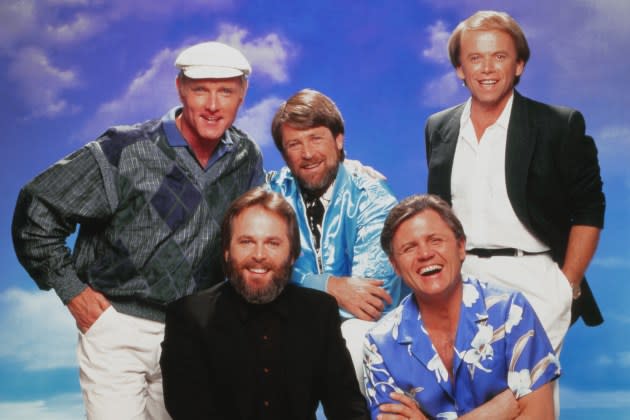‘The Beach Boys’ Doc Is One Endless Summer — and Concludes the Group’s Story Far Too Soon

There’s a moment in The Beach Boys, the new documentary about the pioneers of California pop music streaming now on Disney+, in which rock historian and USC professor Josh Kun raises a question that has haunted the band throughout the bulk of its career: “Who are we as artists?”
In the beginning, the core Beach Boys — brothers Brian Wilson, Dennis Wilson, and Carl Wilson, cousin Mike Love, and friend Al Jardine — were a vocal group selling a fantasy about Southern California culture, one where the sun always shined, the girls all wore bikinis, and everyone was waxing down their boards. (Famously, only Dennis surfed.) Later, under Brian’s supposed pop genius, they were studio magicians, releasing orchestral albums like Pet Sounds and intricate compositions like “Good Vibrations,” to both challenge and inspire the Beatles. By 1980, they evolved into a full-fledged rock band, commanding stadium crowds in the U.S. and on the National Mall in Washington, D.C.
More from Rolling Stone
The Beach Boys Get Their Own Disney+ Doc - Here's How to Watch it Online
The Beach Boys Hold 'Family Reunion' at 'Surfin' Safari' Spot in Clip From Band's Documentary
Brian Wilson Placed in Conservatorship as Daughters Win Consultation Rights
Of all those eras, the one that would most likely surprise casual fans — those who know the Beach Boys for the soft rock of “Kokomo” or as Love’s touring oldies act — is that of their rock-star days. Listen to their 1980 live set at Knebworth in the U.K. to get an idea of the band’s full grandeur, with Dennis’s thundering drums adding muscle and even an element of danger to once harmless singalongs like “California Girls.” Alas, The Beach Boys concludes before that period really gets off the ground, choosing instead to tell the band’s Sixties origin story.
To the credit of filmmakers Frank Marshall and Thom Zimny, they get it painstakingly correct, accurately documenting every personnel change within the Beach Boys and sharing the reason behind it. For instance, Dave Marks replaced Jardine in 1962 because the latter wanted to finish school, while Blondie Chaplin and Ricky Fataar were recruited a decade later to help the now Beach men consciously mature their sound. “There was no thought process guiding the group at all,” Love says at one point in an interview.
All the surviving members of the band appear in fresh sit-downs, and there’s a heartwarming climax that we won’t spoil here. But The Beach Boys is primarily a nostalgia trip, buttressed by archival interviews with the Wilsons, as well as some rare footage and family photos that will capture the attention of diehards who thought they’d seen it all.
With the doc concluding in 1980, it doesn’t get into the tragedy of Dennis’s drowning in 1983 or Carl’s death from cancer in 1998. Any overt drama comes from oft-told tales of Dennis’s encounter with Charles Manson and Brian’s mental struggles (yes, he really did lie in bed like the Barenaked Ladies song says).
More subtle but no less apparent tension arrives in interviews with Love and Johnston, who carry on touring as the Beach Boys to this day. Love, rightfully so, remains bitter for not being given songwriting credit by the Wilsons’ authoritarian father, Murry Wilson, whose sale of the group’s catalog sent Brian into a tailspin. Johnston, meanwhile, is peeved over the band’s accolades perpetually being attributed to Brian’s innate production ability. “Brian was lucky to have our voices to sing his dreams,” he says.
In the end, The Beach Boys is part an exploration of a family dynamic and a top view of one of America’s most important bands, with a soundtrack that is undeniably superb (a collection of songs released alongside the film is a must-listen). Taken together, the documents have a chance of re-creating what Endless Summer, the group’s ubiquitous greatest-hits collection, did in 1974 and beyond: Introducing the music of the Beach Boys to a new generation of fans. Not a bad result.
Best of Rolling Stone